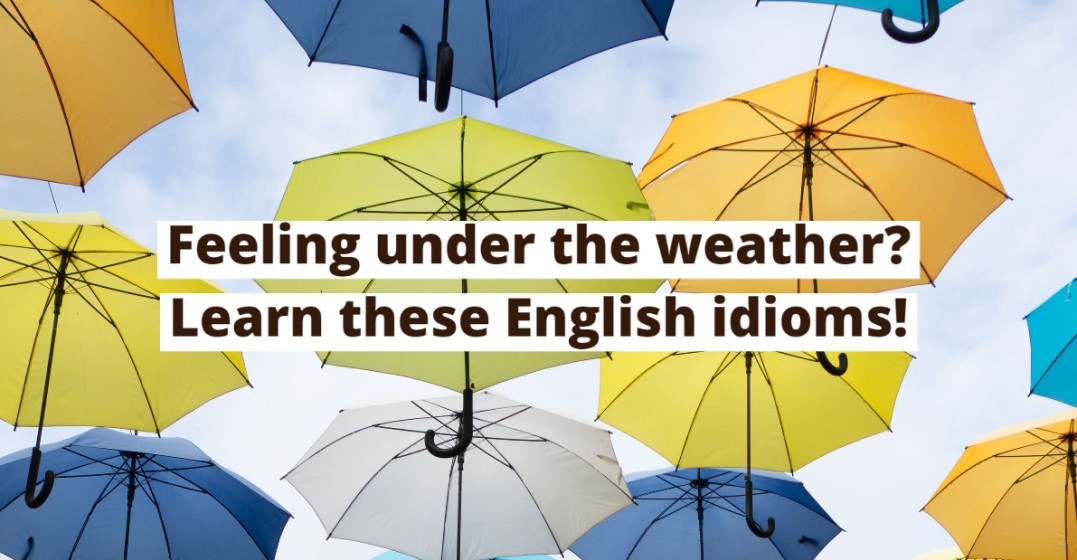11 weather idioms you need to be using
Published on March 17, 2020 / Updated on January 9, 2024
At Lingoda, we have talked before about how important English idioms are if you wish to master the language of Shakespeare. Idioms are not only funny, but they are also very handy since they allow us to convey an idea in the clearest way possible without even mentioning that idea directly. That’s the reason why native speakers use them very frequently and why you need to become familiar with them if you are learning English as a foreign language. To help you broaden your vocabulary and expand your idioms collection, read our cool list of idioms about weather below (pun intended).
In this common idiom, the main part is “a rainy day”. This expression refers to a “possible future time of hardship or relative poverty. When we add the phrasal verb “save up”, we mean to put some money aside for whenever it may be needed. Here we have some examples:
If it’s raining cats and dogs outside, you’d better take an umbrella with you or even stay in, for that matter. The idiom “raining cats and dogs” means to rain very hard or a lot. In this case, the form of the idiom has to do with the weather (i.e.: rain) and so does the meaning.
Be careful with this idiom: the verb “come” never changes here. The meaning of this usual idiom is “whatever happens” or “whatever the weather is“. So if someone supports you “come rain or shine”, it means that they will be there for you no matter what. Let’s see a couple of examples:
Now let’s take a look at the meaning of the idiom a fair-weather friend. This is someone who is friends with you during the good times, but when something goes wrong, they disappear. You can’t rely on a fair-weather friend to stand by you during difficult times. This is the opposite of someone who is there for you come rain or shine.
If you’re “on cloud nine”, you are over the moon – which, by the way, is another idiom. So if you’re “on cloud nine” or “over the moon”, you are extremely happy or delighted.
Have you ever seen a rainbow? Duh, obviously! Okay, but have you ever seen a rainbow up close, like really close? Nope, I don’t think so. That’s because when you get too close, you can’t see it, can you? Well, that’s exactly the meaning of “a rainbow chase”: if you’re chasing a rainbow, you’re after something that is impossible to get or that doesn’t exist.
What does it mean if someone says they are feeling under the weather? This idiom has nothing to do with the actual weather – it means to feel unwell. It’s very vague, but it usually refers to having a cold or some other mild illness. However, because it’s so ambiguous, it’s a great idiom to use as an excuse if you don’t want to do something!
Have you ever ended up having a heated argument over something completely irrelevant? Or maybe you’ve been worried sick about something that you then realized was trivial? That’s exactly what “a storm in a teacup” is: a small problem that has been blown out of proportion. This idiom is also a common one, as we saw last week, and it has different variations. For example, North Americans say “a tempest in a teapot”, which is quite similar to the British idiom.
If a person or a thing is able to “weather the storm”, they can survive a difficult period or situation or deal with a difficult problem. “Weather” is used as a verb in this idiom and it means “to deal with”.
You can also use “weather” with other nouns. Here’s an example:
You can probably guess the meaning of the calm before the storm, as many of us will have seen how still the weather goes before a huge storm rolls in. With an idiomatic meaning, it refers to a quiet and peaceful period before a time in which there are a lot of activity or difficulties.
For the final idiom, we’re sticking with the theme of storms. “Steal someone’s thunder” means to take attention away from someone else or to receive praise for doing something they were going to do.
So, which of these idioms are you going to use in daily life? Do you have friends who are there for you come rain or shine or are yours more fair-weather friends? If it’s raining cats and dogs, you might want to say you’re feeling under the weather rather than have to go out in it and get soaking wet. Whichever idioms you use, remember that speaking perfect English is a rainbow chase (even for native speakers!), but speaking really great English is absolutely within your grasp.
